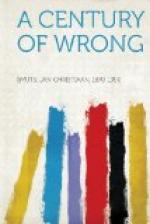The Government and Volksraad of the South African Republic adopted the wiser plan of lowering the price of dynamite to such an extent as to make it about equal to the local European price plus a protective tariff of 20s. per case.
It may here be remarked that Mr. Chamberlain, knowing how unpopular the Dynamite Concession was in the South African Republic, intimated to the Government of the South African Republic, in a very threatening manner, that the Concession was in conflict with the London Convention.
The answer of the Government to this communication was so crushing that Mr. Chamberlain did not again return to the subject. In this he was, no doubt, also actuated by the fact that the most renowned English and European jurists had advised that the concession was in no sense a breach of the Convention. This, however, only became known later, and it is merely referred to now so as to show that no stone was left unturned in order to find a means of humiliating the South African Republic.
[Sidenote: The Netherlands Railway Company.]
2. With regard to the Netherlands South African Railway Company, it would appear that the Capitalists have altered their opinion, and now think that the administration of the Company is as good as can reasonably be expected, and that expropriation is now unnecessary. Perhaps, from their point of view, it would be better to buy up the shares of the Company, and thus become themselves masters, instead of the Government, of this source of income.
Respecting the Railway tariff, it is fair to assume that the cause of dissatisfaction has disappeared, for no complaints are now heard since the tariff was lowered in accordance with the recommendations of the Commission.
[Sidenote: Reduction of import duties]
This change in the tariff, together with the abolition of duties on nearly all necessaries of life have made a difference of about L700,000 in the income of the State during the last year. It will be admitted that this is an enormous item in comparison with the total income of the South African Republic. The above tends to show how anxious the Government of the South African Republic has been to remove all grievances as soon as it was proved that they actually existed.
[Sidenote: Liquor, Pass, and Gold Thefts Laws.]
3. As regards the administration of the Liquor Law, the Pass Law, and the Law dealing with Gold thefts, neither the Government nor the Volksraad felt at liberty to adopt the recommendation as to constituting an Advisory Board on the Witwatersrand. They decided to go deeper to the roots of the evil, and so altered the administration of the Laws that the evidences of dissatisfaction have disappeared. Indeed, no one ever hears of gold thefts now, and the representative bodies of the mining industry have repeatedly expressed their satisfaction with the administration of the Pass Law, and especially with that of the Liquor Law.




